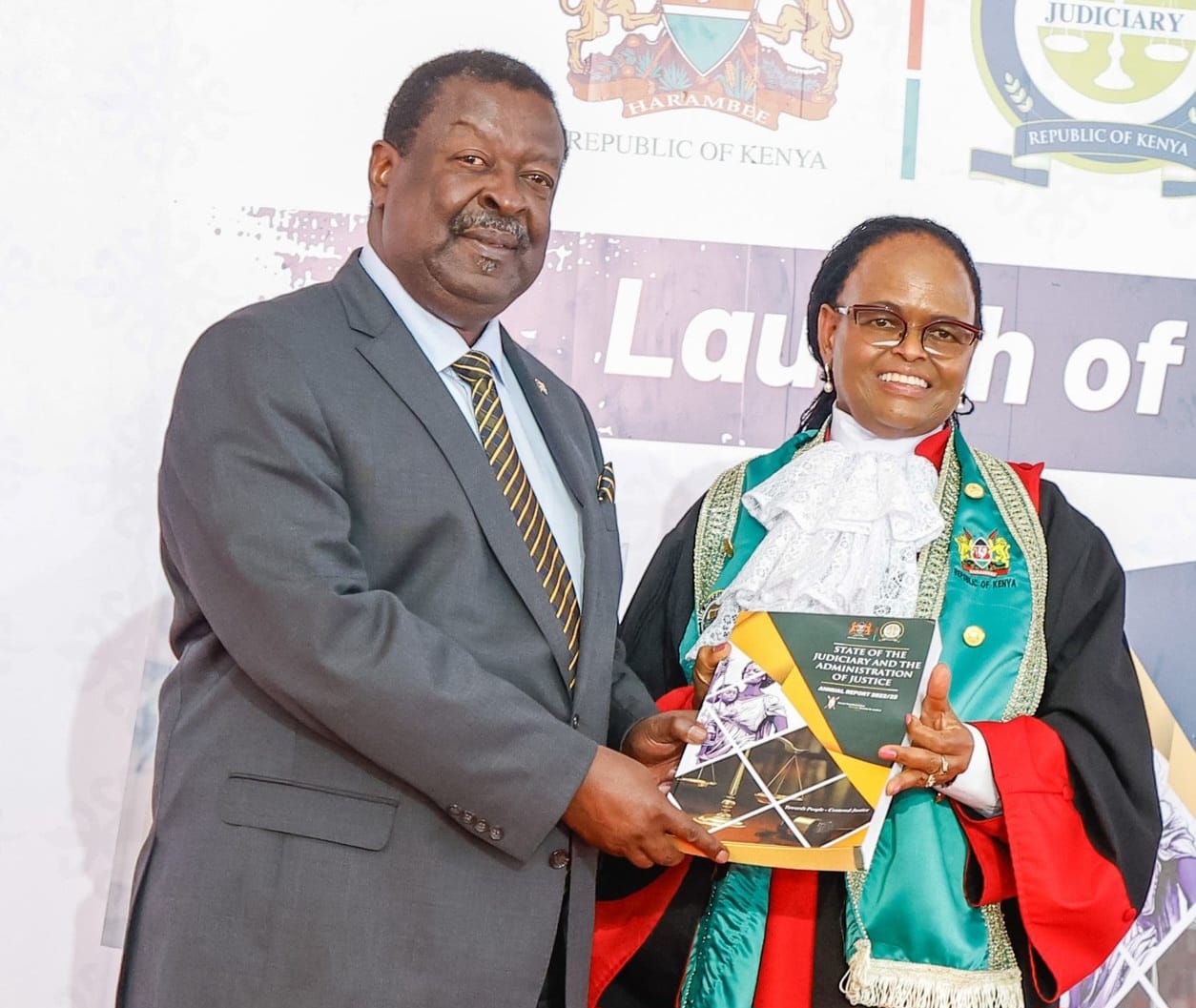Prime Cabinet Secretary Musalia Mudavadi has urged Judiciary to work together with other institutions within the legal and justice system in building a society where justice is not a privilege but a fundamental right for all Kenyans.
Mudavadi called upon the institutions to ensure a holistic approach to justice.
“Let me reiterate that the Executive will not relent on its commitment to support the Judiciary in carrying out its constitutional mandate of upholding the rule of law and protecting the rights of the people. Together, we can shape a future where justice is not merely a concept but a living reality for all.” he said.
Mudavadi said Kenya’s Constitution 2010 provides a comprehensive list of values and principles that obligate all state organs, state officers, public officials and individuals to adhere to.
He stated that Kenya has earned its place among democratic states regionally and internationally for it progressive and transformative constitution.
“It is now 13 years and we should be proud that we have done it. It has taken us that short period of time to inculcate and begin living the Constitution whereas in many other jurisdictions, such an enterprise has taken many years but failed, stuttered or is convoluted in contestations and conflict,” said Mudavadi.
“Despite a few hiccups, we must celebrate the single-minded execution of the Constitutional framework by the Executive, Legislative and Judiciary organs of Government. Each has kept to their lane, respecting the mandate, powers and functions of the other for the stability we now enjoy,” he added.
Mudavadi during the the launch of the Social Transformation Through Access to Justice (STAJ) Blueprint (2023-2033) at the Supreme Court grounds where the presentation of the annual State of the Judiciary and Administration of Justice Report (SOJAR) for the 2022/23 financial year also took place.
While commending the Judiciary for adhering to the letter and spirit of the Constitution, Mudavadi pointed out that the Bill of Rights has extensive social, economic and political rights, and is a welcome shift from years of yore when rights and freedoms of wananchi were taken as a government privilege; never to be seen or heard.
Mudavadi further lauded the Judiciary for its readiness and commitment to scale up its services to Kenyans challenging the Judiciary to ensure thorough implementation of the Social Transformation Through Access to Justice (STAJ) Blueprint and underline its promise as an institution to be accountable in fulfilling its mandate.
“I have keenly scanned The Social Transformation Through Access to Justice (STAJ) Blueprint (2023-2033) vision of the Judiciary and I have noted the embedded five guiding principles of accessibility, efficiency, transparency, accountability, inclusiveness and shared leadership cooperative dialogue and social justice,” he stated.
“Interestingly, each principle has an outcome that positions the Judiciary in focusing on transforming society by ensuring that all citizens, irrespective of status or geographical location, have access to judicial services. This is how it should be, seen and heard because, as the adage goes; justice must not only be done, it must be seen to have been done,” he added.
Mudavadi noted that the Judiciary is now focusing on transforming our society and ensuring that all citizens, irrespective of status or geographical location, have access to judicial services.
“From the Executive, one is jealous of the Judiciary that is miles away in its decisions that have encouraged more people to seek justice whenever their rights have been trampled upon. We in Executive are equally ambitious and are in competition in creating a fervently productive Kenyan,” he pointed out.
He lauded the milestone achieved by the judiciary in the recent past including establishment of High Courts in at least 45 counties, the utilization of technology in case filing thus granting ease of access to justice to many Kenyans and the establishment of specialized courts such as the Sexual and Gender Based Violence Court and the Small Claims Courts.
The Prime Cabinet Secretary said rapid integration of technology in processes to improve court operations as seen through the e-filling and virtual hearing and training plus capacity building for all judicial officers should remain a priority.
Mudavadi affirmed that a transformative and progressive Judiciary will support the Government’s Bottom-up Economic Transformation Agenda (BETA) and enhance the governments’ commitment to empower ordinary citizens.





